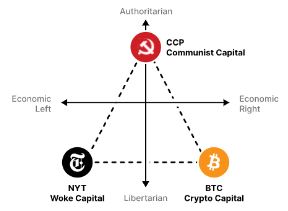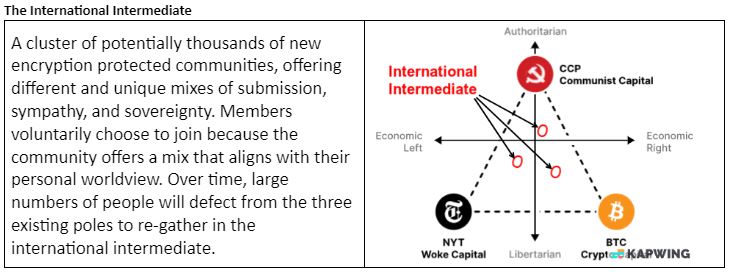
Problem #1 – A Tripolar World
Balaji presents an interesting Tripolar model of three important ideologies currently vying for power in the World. To one degree or another, most people are influenced by at least one, if not more, of these ideological poles.

Woke Capital – The ideology of America’s ruling class as explicated by America’s ruling newspaper, The New York Times. It’s capitalism that enables decentralized censorship, cancel culture and American empire.
Requirement – You must sympathize.
CCP Communist Capital – The ideology of the Chinese Communist Party; capitalism checked by the centralized power of the Chinese party-state: Leninist, Confucianist, Capitalist, and Nationalist.
Requirement – You must submit.
BTC Crypto Capital – The international ideology of Bitcoin and web3. Stateless capitalism, capitalism without corporations, decentralized censorship-resistance, and neutral international law. It is the second pole within both the US and China, the one that domestic regime opponents align around.
Requirement – You must be sovereign.
Each of these political ideologies presents extreme positions, rendering any of them unattractive. The CCP pole, for instance, requires total submission, creating great difficulty for those with even a partially independent mind. Woke Capital demands sympathy for victims and acknowledgement of one’s role as an oppressor. Crypto Capital espouses complete sovereignty which in the extreme means making your own shoes and pumping your own water. None of the poles are attractive individually; and currently, no acceptable mix of submission/sympathy/sovereignty exists.
Imagine the following scenario: instead of three ideological poles, there are three islands. One restaurant, per island, represents the only source of food, respectively. Those who want to eat must go to the restaurant on their island. Imagine how constraining the food situation would be and the chaos that would ensue. Consider the political battles between preference groups to control the local restaurant. Now imagine the emergence of a new technology that allows island residents to secure food deliveries from hundreds of restaurants. How many would take advantage of these expanded options? Imagine the peace dividend that would emerge as people moved into a voluntary world of food.
If choice in food is important, is not political choice even more important? The network state highlights a path that startup societies can use to build communities offering better submission/sympathy/sovereignty mixes. Collectively, these new communities will reconverge on the center into what Balaji calls the International Intermediate. Tremendous demand exists for voluntary alternatives to the poles.

In a network state world, people will no longer be trapped in political ideologies, parties and institutions imposed by the establishment in a top-down manner. Rather, people will select and build their own high trust institutions from the bottom-up. Network states will usher in innovation enabling the construction of something better than any of the three poles.
My Tripolar Question – The power of corporations, corporatism and the “Davos Man” are not reflected in the model or the book. How does corporate power interact with the network leviathan?
Problem #2 – Reform from Within is Impossible
Complex systems such as the CCP or NYT cannot be reformed from within. Even much smaller and simpler institutions are virtually impossible to reshape. Consider the idea of buying a manufacturing company with the idea of reforming it into a social media corporation. The idea is crazy! With respect to reforming modern democracies, it might be compared to steering a ship with 1,000 different rudders. Even if a reformer manages to gain control of one rudder, there may be numerous rudders steering against the reformers. So, if institutional change is sought, and reforming existing institutions is not practical, then starting from a blank slate might be the best option.
In the business world, entrepreneurs typically start new companies rather than reforming existing ones. Tech companies are notable examples of how much value is created via the ability to start something new. In the world of governance, however, starting something new is unthinkable and sometimes punishable. This phenomenon is particularly true in a world where all physical land is spoken for. Identifying a country willing to shave off a piece of its sovereignty in favor of a startup society has proven extremely difficult.
In order to reset the “gameboard” with respect to approaching governments, Balaji recommends negotiating with governments for land as a last step, rather than early in the development of a startup society. By focusing on building the community online first, startup societies can build a population, economy and capital base, positioning them to be taken seriously by nation states as important partners and value creators.
Reforms to large institutions, like governments, impossible from the inside might be possible from the outside. By increasing competition and choice within the governance space, network states can become powerful catalysts in the formation of parallel institutions. Citizens will no longer be glued to one of the three poles. Rather, they will exercise choice regarding where they want to operate from a submission/sympathy/sovereignty standpoint. Through competition, the poles will move closer to the center and that is what effective reform looks like in the future.
Problem #3 – Innovation – “If you do not agree on anything, you cannot do anything.”
“Consensus is upstream of innovation” Balaji Srinivasan
Current regulations significantly choke innovation in all areas except technology. We could and should be living in George Jetson’s world. The opportunity cost of slowing innovation has been tremendous. Network states offer an opportunity to turbocharge innovation via the establishment of small innovation zones ( –i.e., FDA free zones) where less stringent and costly regulatory procedures apply. To reignite innovation, zones with a fundamentally different understanding of and tolerance for risk are required. Innovation poses risks; but so, too, does failing to innovate. Far more people died from FDA regulation than were saved by it. Why should one level of risk tolerance be applied to all? Network states open the door to renewed innovation for a host of reasons, but principally because they facilitate consensus.
Currently people are sorted into communities based upon their birthplace (national citizenship). Does sorting people in such a system make sense in a networked world? A century ago it may have been the only option. People born in the same location were often genetically, culturally, linguistically and religiously similar. However, in a networked world, people exchange ideas with people across the globe. Relying on “citizenship by birth” foments nasty social environments and action paralysis as consensus often no longer exists. Network states solve this problem by allowing people to sort themselves into coherent communities based upon consensus and voluntary agreement. Almost everyone would have more of what they want in a network state world because consensus becomes possible.
Problem #4 – Fake History
“We need a form of truth powerful enough to stand outside any state and judge it from above.” Balaji Srinivasan
The foundation for each of the poles described in the tripolar section above (problem 1) is based upon an establishment “story” about history. That is, history as relayed by the establishment is just a politically expedient story outlining what they say happened, why and who the villains/heroes were. This story is presented as fact, where political rivals are inevitably evil. Balaji describes these regime validating parables as “political truth” or “top-down truth.” When history is recorded for the benefit of the establishment, the populace becomes disoriented. A bottom-up version of macro-history would go a long way towards providing a truer history story. History recorded to a blockchain would become uncensorable, digitally signed and time stamped. Thus, network states extract the ability to define truth from power by recording events to the ledger, and in so doing, will go a long way towards checking “political truth”.
Problem #5 – Pre-Internet Institutions are Collapsing
Statists think their god can never fail. They are in for a surprise.
Under even cursory examination, many government programs produce the opposite of what they profess. The war-on-drugs cannot keep drugs out of prisons; the war-on-terror increases terrorism; and anti-inflation efforts rely on printing money. Studying government policy is like watching a “fails” video on YouTube.
The many and complex reasons governments are failing is beyond the scope of this article. One trend worth mentioning, however, is the extraction of value from the physical realm. Governments make their daily bread by carving out a portion of the value created between borders. As the internet moves towards maturity, high value digital work (–i.e., design, engineering, data analysis) can and will be separated from lower value activities such as manufacturing. This higher value work will move into the cloud, outside the reach of inhospitable governments. The implications of this trend regarding government revenues are substantial.
Imagine what would happen if high value work classifications (–i.e., programmers guild) organized into network unions. They would create huge pools of value they could leverage to negotiate for an optimal digital domicile. The full arrival of the internet in a way that negates the value of place will transform the sovereignty marketplace, while completely reshuffling which nations are considered winners and losers.
I also wonder about the continued viability of many industrial era corporations. They appear to be intertwined with governments and I question their ability to operate at internet speed. Also, corporations are very much creatures of “place” in that they rely heavily on legal agreements and intellectual property protection tied to place. They also benefit from regulatory barriers to entry, access to cheap capital, tax breaks and subsidies. These benefits will not be forthcoming in a network state world. How will corprations be impacted by a world where place is much less important?
Problem #6 – Special Interest Infiltration
Legacy institutions have a terrible record of remaining true to their founding vision. Consider the United States as an example. The country was founded as an experiment in limited government and explicitly acknowledged the need to protect citizens from the government. A little over 240 years later, the U.S. government has become the largest government in history and recognizes no limits on its authority. Institutions of justice dispense injustice, media organizations peddle propaganda and consumer protection agencies deliver consumer exploitation. How did this happen?
As Klaus Schwab of The World Economic Forum likes to say, “We have penetrated many government cabinets.” Whether it be via the WEF, WHO, FED, CIA or multinational corporations, a variety of tactics are used to penetrate decision making bodies. Once captured, these institutions produce massive financial and power gains for those controlling them. Imagine what might happen if drug company scientists sat on regulatory approval bodies or if executives moved regularly between regulatory and drug company employment. Wait a minute, you don’t have to imagine – that is how the system currently operates! In most cases, legacy institutions present easy targets for “single point corruption.”
Once key decision making positions intended to hold institutions accountable are captured, little can be done to save the organization. Surprisingly few questions are asked, such as: What is the organization’s stated purpose? Is it achieving that purpose? How are decisions made and what decisions have been made, to date? Do decision makers have conflicts of interest; and if so, what steps are taken to eliminate the conflicts? Answer – major conflicts of interest are ignored and profited from. Ultimately, almost all legacy institutions operate in secret.
In a network state world, a top-down monopoly of institution creation will not survive. People can and will rebuild open and auditable institutions from the bottom-up. Instead of relying on single point decision makers operating behind closed doors, stakeholders will participate directly in decision making and the entire process will be open for examination by anyone. Without a single point of corruption, new bottom-up institutions will do a much better job of serving their stakeholders’ interests. (Problem #6 – Not from The Network State)
Navigation
- Part I – Definition, Introduction and Frontiers
- Part II – On Leviathans: God, State, Network
- Part III – Problems Solved by the Network State
- Part IV – Trends Driving the Network State
- Part V – Designing a Startup Society and Building a Network State
- Part VI – Network Unions
- Part VII- The Impact of Network States, Two Predictions and One Question